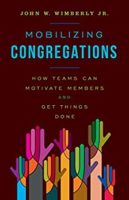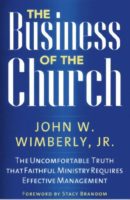When I told the pastor that I wanted to use some of my time at his staff retreat to discuss performance, he responded (with a smile), “Performance is a word we don’t use in our denomination.” With a similar smile, I replied, “Not to worry, we don’t use it in my denomination either.” While we were joking, we were also serious. Performance is a subject that is avoided in too many congregations.
Why is discussion of performance not a major topic in congregations? It certainly is a major topic in most non-profit and for-profit organizations. Indeed, for successful organizations, a drive to perform effectively and efficiently is at the heart of their vision. To change the world, we need to be performing at peak efficiency. For example, books written about Dr. King’s civil rights work reveal one of the highest performing organizations in our nation’s history.
Whether it be the performance of the congregational system as whole, parts of the system such as committees or teams, or individual staff members, performance is not a topic we embrace in most congregations. Yes, many congregations have a system of annual performance reviews. However, even many of those tend to be seemingly unrelated to performance. Following a performance review, under–performing staffers continue to be employed; high performing staffers aren’t rewarded (monetary reward is probably the least important of the rewards a congregation can give an excellent staff person); average performers aren’t coached to improve.
What is our aversion to focusing on performance in the life of a congregation? I think some of it has to do with bad theology. Christian congregations can take Jesus’ words about “judge not lest you be judged” and let under-performing staffers, volunteers or committees continue to under-perform, unwilling to “judge” them. In contrast to such fear of judging, Jesus had no problem questioning the performance of his team. Numerous times, he called out the disciples for misunderstanding or not doing what he expected of them. A corollary is found in Moses who repeatedly questioned the performance of his congregation as he led them to the Promised Land.
Second, another part of our aversion to performance has to do with fear of conflict. We want our congregations to be warm, loving, safe places. There is nothing wrong with that sentiment. However when a love of harmony produces a fear of raising performance issues, it becomes unhealthy.
Isn’t performance a factor in a loving family? In a healthy family, don’t we have expectations of what we will do and how we will relate to each other? My parents were certainly very clear about my performance when it was less than what they expected! There is nothing wrong with performance standards in a family.
Third, when we do address performance, the discussion usually focuses on underperforming staff members or committees/teams. Why? When that happens, we are sending high performing people and groups the wrong message: “If you don’t perform, you’ll get attention. If you do perform, we’ll ignore you.” One reason to focus on performance is to celebrate the accomplishments of high performing staff members, committees and teams.
Fourth, as someone who analyzes the behavior of congregations as systems, I urge my clients to stop focusing obsessively on the low performance of one part of the system. Think instead of the larger system. Is it performing? If not, why not? The underperformance of a system is usually not caused by one individual part. It is something, well, more systemic.
How many congregations have we seen futilely change pastors, rabbis, educators or music directors in search of improved congregational performance? While it may very well be that a congregation needs a new staff person in some area, it is just as likely, perhaps more likely, that the congregation has systemic issues that are undermining its performance.
We can replace parts of the system all day and all night. But if it is a systems issue, a new part will not be any more effective than the old part in creating a solution. Take the example of the D.C. Public School system. The vast majority of teachers in D.C. rightly receive high performance evaluations. And yet the system as a whole continues to struggle to meet its targeted performance measurements. There is something in the system that undermines the performance of the individual parts. Hopefully, one day school leadership will stop firing teachers and principals in search of improved performance and, instead, fix the systemic issues.
Ultimately, the key to strong performance is accountability. In worship, we preach about the fact that God holds us accountable for the way we lead our lives. Does that message not also apply to the life of our congregations? Are we willing to hold ourselves and others in our congregations accountable for our/their performance? Are we willing to have the tough conversations that are required to improve performance? Can we celebrate our accomplishments when we perform at high levels?
With all this talk of performance and accountability, you may be surprised to know that I do not consider annual performance evaluations to be terribly effective in increasing a congregation’s or staff member’s performance. UCLA Management professor Samuel Culbert has written a compelling book in which he is highly critical of performance reviews as a tool to improve performance in an organization. A summary of the book can be found in an article by Culbert in The Wall Street Journal. In it, Culbert argues not just against annual performance reviews; he argues in favor of ongoing attention to performance. The key, he says, to improved performance by members of a staff team is to “guide, coach, tutor, provide oversight and generally do whatever is required to assist a (staff person) to perform successfully.” Culbert recommends that we improve performance on the go. To me, it sounds a lot like Moses leading the people across the desert or Jesus leading his disciples to this day.
If we can make performance of our congregations (as a system) a driving agenda rather than a dirty word, a lot of nagging things that hinder our effectiveness will disappear. God is judging our performance. Dare we do anything less in our congregations?
John Wimberly is an experienced pastor and consultant. As a consultant, he has worked with congregations and judicatories on strategic planning, staff designs for the 21st century, and congregational growth as well as financial and administrative management. He has MBA, MDiv, and PhD (theology) degrees. His books focus on effective management and leadership. John believes congregations can have a bright future!



